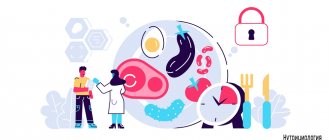Ecology of health: Water fasting is a complete refusal of food (in solid or liquid form). Simply put, we don’t eat anything and drink only clean water...
There are 2 types of fasting:
- dry fasting,
- water fasting.
Some methods of long-term fasting involve the use of both types. Sometimes fasting days on juices and vegetable decoctions are called fasting, which is essentially not true. In this article we will talk about water fasting - the least extreme form of fasting .
Water fasting is a complete abstinence from food (solid or liquid). Simply put, we don’t eat anything and drink only clean water at room temperature in sufficient quantities.
Important: The amount of water that you drink during your normal diet will not be enough during fasting! After all, solid food also contains water - when fasting, you should replenish the amount of water that usually comes with food! It is impossible to give exact recommendations on exactly how much water you should drink. Just drink more often. Sufficient intake of water helps eliminate toxins and prevents possible complications during fasting.
Something else important: While fasting, do not use a toothbrush or toothpaste to brush your teeth - the enamel may be damaged due to changes in the composition of saliva during fasting. Wipe your teeth with gauze and rinse your mouth with a decoction of chamomile and St. John's wort so as not to remove plaque that protects tooth enamel.
WATER FASTING
Fasting in some cases can pose a danger to health and life. At the same time, fasting is such an effective way to cleanse and heal the body that it can help you achieve ideal health and youth, recover from many diseases, including the most severe ones, and save lives. This article is for informational purposes only and the author is not responsible for the use of this information.
Fasting can last from one day to... several months, or even years. True, in this case it is no longer fasting, but a certain way of eating - life without food. The determining factor is the duration of fasting on water.
How many days the fast lasts depends on:
- The principle of water fasting is what processes occur in the body.
- The result of fasting on water is cleansing the body, losing weight, improving health and rejuvenation.
- The dangers of water fasting - precautions and possible negative consequences of fasting, which can be extremely serious if these precautions are not followed.
- Coming out of fasting on water is an extremely important moment.
So, let's look at what happens at each stage of water fasting (at different durations of fasting).
Number of days a person can go without food
Opinions vary about how long you can live without food.
Proponents of the technique claim that this period is up to 60 days, subject to unlimited water consumption. But these data are generalized. When determining a safe duration of fasting, experts advise taking into account the age, gender, body weight and health status of a person, as well as the climate zone in which he lives. In order not to harm your health, doctors recommend practicing fasting at home for no more than 5 days. Those who plan to stick to the regimen longer need to be under constant medical supervision.
Important to remember
Sometimes even a day of hunger strike can bring severe, irreversible consequences, especially if the practitioner belongs to a “risk group” for whom fasting is contraindicated. After all, this is stress caused to the body deliberately. Fasting should not be perceived as an easy, quick way to lose weight; it is a serious, complex method that includes several stages.
Doctors' opinions about him are complex. Some experts agree, yes, fasting is an ancient method of quick cleansing, often used by doctors; there are known cases when it alleviated the course of a serious illness or completely cured it. And now, along with the development of technology and laser surgery, sometimes people are prescribed short fasting, purely for medicinal purposes.
However, a number of side effects of fasting cannot be denied. Problems with the gastrointestinal tract, metabolism, the risk of exacerbation of existing diseases or the emergence of new diseases. Sometimes the danger of a technique outweighs all its advantages.
Contrary to the opinion of doctors, folk practitioners are sure that fasting is wonderful and natural. Even the prophets and philosophers of the ancients staged voluntary hunger strikes, wanting to clear their minds, gain inspiration, and new ideas. People can and should use a method that has been proven over the years, centuries, the main thing is to follow the rules described, find out how to fast correctly, then the result will definitely come.
Who to believe? After all, doctors don’t worry without reason, and practitioners seem to describe their own experience of a starving person. A compromise can be found. For example, having chosen a fasting method, undergo a medical examination and obtain the consent of a specialist. At the same time, find out more about fasting. Perhaps the doctor will help adjust the fasting conditions to suit the patient’s individual capabilities. Then the possible risk will decrease.
By the way, there are special centers where people fast in groups in a hospital setting. There doctors constantly monitor their condition, give advice, and support. Sometimes it is easier to fast with company than alone.
It is not necessary to choose exactly the 14-day fasting method; a more gentle regime is suitable for beginners.
General concept of water fasting
Before you start practicing the technique, you need to understand what happens in the body when it stops receiving food.
The essence of the process
During the fasting period, a person completely refuses to eat. To maintain the vital functions of the body, he drinks water in unlimited quantities. Physical activity is prohibited.
The man eats nothing and drinks water.
Principle of action on the body
When the body stops receiving food, it begins to use up its internal reserves to maintain the functioning of organs and systems.
First, it receives energy from glycogen and fat deposits, then from proteins that form tissues. The digestive tract ceases to perform its main function, which is to process solid food. This helps it to independently cleanse itself of hardened feces accumulated in the intestines.
Together with them, toxins, allergens and toxic compounds are removed, which provoke the development of serious diseases.
Benefit
In a cleansed intestine, the microflora is normalized, since pathogenic microorganisms stop multiplying in it, leading to its inhibition.
In people who practice water fasting regularly, the body produces specific enzymes that trigger the process of self-dissolution of pathological cells and tissues. This leads to relief from diseases of varying severity.
Thanks to fasting, gastrointestinal diseases go away.
Other beneficial effects of fasting:
- inflammatory elements on the skin disappear;
- the condition of nails and hair improves;
- the craving for smoking, alcohol and drugs decreases;
- inflammatory diseases of the gastrointestinal tract go away due to the cessation of production of hydrochloric acid in the stomach;
- blood glucose levels are normalized;
- metabolic processes improve;
- weight loss;
- immunity is strengthened.
It is difficult to see positive changes in the body after a short one-time refusal of food.
To achieve the effect, you need to practice it several times a year.
Contraindications to fasting
In general, contraindications to fasting are:
- insulin-dependent diabetes;
- malignant tumors;
- pulmonary tuberculosis;
- viral hepatitis;
- cirrhosis of the liver;
- renal failure;
- inflammatory vascular diseases;
- heart failure;
- severe encephalopathy;
- critical deficiency of muscle mass.
Therapeutic fasting. Indications and contraindications
Individual cases depend on the presence of diseases, as well as the duration of hunger.
Preparatory activities
An important preparatory stage, on which the result of fasting directly depends, is the correct choice of water.
Water quality
To improve your health, experts advise drinking good quality raw water. It is best to choose bottled from a trusted manufacturer. There are no harmful impurities or salts in such water; a person can consume it without restrictions.
You need to drink good quality raw water.
You can also use soft well water. Hard water will not work because it contains a high concentration of salts, which the body will have to spend additional effort to remove. In addition, salts are deposited in the kidneys and liver in the form of stones and sand, causing problems in the functioning of these organs.
During the fasting process, some healers advise drinking distilled water. It does an excellent job of removing toxins and salts.
It is highly undesirable to drink tap water, as it may contain microorganisms that are hazardous to health.
By consuming it, instead of improving your health, you can get the opposite effect.
Preparation
The main tasks of preparing for fasting:
- reduce stress levels;
- reduce intoxication;
- maximize the benefits of the procedure.
Preparation stages:
- Familiarize yourself with the methodology, study contraindications and symptoms of adverse effects.
- Choose a suitable time, taking into account deadlines.
- Carry out cleaning procedures.
- Follow your diet.
Features of preparation:
- an important factor is the psychological attitude;
- the timing and technique of preparation depend on the type of fasting and the chosen method;
- cleansing procedures may include natural (through diet) or forced (using enemas and laxatives) bowel cleansing;
- a special diet will allow you to carry out healing processes with greater impact - in a prepared body, more energy will be released for this.
Basic rules and steps
Regardless of how many days a person plans to go without food, he must adhere to the basic stages of fasting. Failure to comply with this rule will lead to disastrous results, especially if a long-term refusal of food is planned.
Entrance
You cannot start fasting without preliminary preparation, otherwise the body, deprived of food, will begin to experience stress.
You need to give up fast food.
You need to enter fasting gradually, over 2-3 days. At this time, it is recommended to avoid eating fast food, sweets, alcoholic beverages, fatty and fried foods. Portions should be halved. You need to have dinner 3-4 hours before bedtime. The diet during the preparatory stage should consist of cereals, vegetables, fruits and dairy products.
On the day before the start of fasting, you need to give up dinner, replacing it with water.
The next morning it is necessary to do a cleansing enema, even if the act of defecation has taken place. It will remove the remaining feces from the intestines and start the process of self-cleansing the body.
Starvation
During the entire period of abstinence from food, it is recommended to drink 2-2.5 liters of water at room temperature per day. In winter, it can be slightly warmed up. Drink water in small sips as needed.
Exit
The purpose of breaking a hunger strike is to start the digestive system. This stage is twice as long as the period of abstinence from food (for example, with a 1-day fast it is 2 days, with a 7-day fast it is 14).
The way out of the diet begins with drinking juices.
At the exit stage, it is necessary to gradually introduce foods into the diet, following a strict sequence:
- Start by drinking freshly squeezed juices (apple and carrot). From the first to the third day they are drunk diluted with water, from the fourth to the fifth - undiluted.
- On the 6-7th day, the menu gradually includes salads of fruits and vegetables with the addition of a small amount of olive or sunflower oil. Prepared without salt.
- After a week, you can start eating porridge cooked in water. Nuts and seeds are added to them.
- 10 days after completing the fast, the menu is expanded with low-fat fermented milk products.
This diet should last up to 6 weeks, and sometimes more (depending on the length of the period of restriction). Eggs, meat and fish are eaten last.
“Friends scared me that I’d put my stomach”
Sergey Kirmel (34 years old) is keen on healthy lifestyle. I decided to add therapeutic fasting to my program a year ago. Last year he had a total of 52 days of abstinence from food.
- Why did you get carried away? This is a natural cleansing mechanism. Any animal, when sick, simply does not eat or drink until it recovers.
I started with a day: on Friday evening I stopped eating and so on until Sunday morning. It turns out to be about 30 hours. The first time, of course, it was unusual, I was hungry. Then I tried dry fasting and it was generally easy. It is believed that one day of dry fasting is equivalent to three days on the water.
I start out with juices. Then I add fruit - I chew the pulp, but I don’t swallow it, I spit it out. Then I start eating light foods, such as greens. The later you start eating meat, the better. I remember that after dry fasting I had a very strong gluttony. I broke down on the second day of leaving.
In between fasting periods I eat a lot of vegetables and fruits. I rarely consume meat and dairy products.
I abstain from food for one day, two, five. I fasted for a week at most. I try not to have any food at home at this time so that there is no temptation. It is advisable to do something all day. I don’t feel any loss of strength - I also play football.
90 percent of my acquaintances dissuaded me. They frightened me: “You’ll die, you’ll lose your stomach.” But I didn't pay attention. For me, this is a renewal of the whole organism. My general condition has become much easier than before. There is, of course, also a decrease in body weight. A year ago, with a height of 190 cm, I weighed almost 108 kg. Literally in the first months of fasting, 10 kg fell off.
Types and methods of therapeutic fasting
The duration of fasting depends on what goal the person is pursuing. To lose weight, increase immunity and prevent serious diseases, a period of abstinence from food for up to 7 days is suitable. In case of severe pathologies, you will have to live on the water longer.
One-day
Refusal of food for 1 day helps to cleanse the intestines and blood vessels, reduce waist size by 1-2 cm, and improve the functioning of the nervous system. By regularly resorting to this procedure once a week, you can:
- strengthen the immune system;
- cleanse the skin of pimples and acne;
- increase the body's endurance;
- improve metabolism;
- get rid of 2-3 kg of excess weight per month.
A one-day fast will help clear your skin.
Three-day
The technique is popular among those who want to quickly lose weight and strengthen the body. When you refuse to eat, the interstitial fluid is cleared, inflammatory processes in the small intestine and stomach are reduced.
It is recommended to practice a 3-day fast no more than once a month.
Seven days
In people who drink only water for a week, the epithelium of the gastrointestinal mucosa is restored, blood vessels are cleansed, and heart function improves. A 7-day fast stimulates liver regeneration and starts the process of resorption of small tumors on the skin and mucous membranes.
Seven-day fasting improves heart function.
Doctors do not recommend fasting for 7 days more than once every 3 months.
Ten days
Those who refuse food for 10 days experience skin rejuvenation, bile ducts are cleansed, and bone tissue is restored. In addition, fasting helps restore liver and kidney function.
The frequency of this health practice, as in the previous case, should not exceed 1 time in 3 months.
Twenty one days
A 3-week stay on the water is a difficult test, which can only be attempted if a person has easily endured hunger for 7-10 days. During this period, the functions of all vital organs are renewed, the volume of fat deposits decreases, and recovery from chronic diseases occurs.
With a 3-week fast, the volume of body fat decreases.
Such a long fast can be repeated no more than once a year. It can cause physical exhaustion, nervous disorders and other undesirable consequences, so it should be carried out under medical supervision.
Forty days
Fasting for 40 days is the most difficult.
It is resorted to in extreme cases, if a person is sick and cannot be healed in other ways. Long-term refusal to eat leads to a reboot of the entire body; changes concern not only the physical, but also the mental level. If a person tolerates hunger normally, after 20-25 days he should feel comfortable: weakness and dizziness disappear, vigor appears, sleep normalizes, bad breath disappears. The absence of these symptoms indicates that recovery is not occurring. In this case, the starving person needs the help of doctors.
Naberezhnye Chelny
Wellness
15 kilometers from the city of Naberezhnye Chelny, on the territory of the Nizhnyaya Kama nature reserve, there is a wellness center where clients are offered not only physical but also spiritual cleansing, work on themselves and a change in worldview. All this should be facilitated by the nature that surrounds the center, forest and river. This is what, according to the authors of health programs, should remind one of a harmonious life in harmony with nature and oneself. Cleansing here is carried out without medication, using healing fasting techniques.
In addition to fasting itself, clients are invited to do gymnastics using Strelnikova’s method, attend a bathhouse and massages, listen to a course of lectures on proper nutrition, and also take walks using a special health-improving technology.
The center offers several fasting programs: cereal fasting, using vegetable juices, water fasting, dry fasting and various combined options.
The authors of the programs promise not only weight loss, but also increased immunity, as well as improved metabolic processes of the body and optimization of the functioning of its systems. Procedures will not be performed if you have cholelithiasis, heart and blood diseases, epilepsy, open tuberculosis, malignant tumors, or are pregnant.
Author's methods for losing weight
Water fasting was practiced by various healers. Each of them left their own methodology.
According to Bragg
Paul Bragg is an American naturopath who developed his own fasting system. He advised drinking only distilled water. In addition, people who are fasting according to his method can eat 5 g of honey daily and drink 10 ml of lemon juice. The naturopath did not support the idea of using enemas and laxatives to cleanse the colon.
According to Bragg, you cannot eat food, you can only drink distilled water.
In between periods of food refusal, Bragg recommended adhering to the principles of proper nutrition.
According to Nikolaev
Nutritionist Yu. S. Nikolaev advised a 3-week fast on distilled, mineral or boiled water.
In addition, he recommended drinking a glass of rosehip decoction in the morning and before bed to speed up the cleansing of the body. The author of the method paid special attention to preparing for fasting, in which he distinguished 2 stages:
- Psychological. A person must tune in to a positive result, convince himself that healing awaits him, and not a difficult test.
- Physiological. A consistent decrease in the energy value of the diet with a parallel increase in the volume of water consumed. On the eve of the start of the restriction period, it is necessary to do an enema.
Nikolaev advised combining food refusal for 3 weeks with water procedures, self-massage of problem areas, breathing exercises, walks and rest.
He urged his followers to fast under medical supervision.
According to Suvorin
Domestic naturopath A. Suvorin developed fasting techniques lasting 2, 6 and 9 weeks. The last option can be called extreme; it is not successful. But cleansing according to Suvorin for up to 2 weeks has found many fans, as it helps to heal and lose weight.
According to Suvorin, you need to be under medical supervision.
For those who are fasting, the naturopath advises drinking distilled water and giving enemas regularly.
In this case, you must be under medical supervision.
By Marva Ohanyan
Doctor Marva Ohanyan is sure that all diseases develop due to poor nutrition, so if your health deteriorates, you need to start fasting. She developed a 21-day wellness course consisting of several stages:
- Preparations (first 3 days). Cleansing the liver and intestines with fasting and enemas.
- Fasting (10 days). Drinking freshly squeezed juices and herbal decoctions.
- Exit (8 days). Raw vegetables and fruits are added to decoctions and juices.
According to his method, M. Ohanyan advises to repeat fasting every 3 months for 2 years, then twice a year.
According to Stoleshnikov
Professor A. Stoleshnikov developed a fasting method that includes 4 phases:
- Water fasting. The treatment phase lasts 1-4 weeks. During this time, you are allowed to drink only distilled water.
- Exit. Consuming starch-free fruits and juices from them for as long as the fast lasted.
- Recovery. Including raw root vegetables, their juices and herbs in your diet. The duration of this period is identical to the previous ones.
- Raw food diet. Eating raw foods for an unlimited time.
Stoleshnikov developed a method of water fasting.
Stoleshnikov believes that the optimal period of fasting is 21 days. He recommends paying special attention to getting out of it, since if this stage is violated, cleansing the body of toxins will not occur.
Moscow and Moscow region
Medical (SpaGolod)
In order to take a health course at a medical clinic, Muscovites don’t even have to leave their homes: it is located not far from the Botanical Garden and the Yauza. The center was opened back in 1978, and since 1990, its main profile has been therapeutic fasting, prevention and treatment with non-drug means.
The list of services includes liver and intestinal cleansing, physiotherapy, procedures aimed at weight loss and body shaping. The center has many specialists with scientific degrees, and the fasting process is carried out according to the author’s methodology, approved by the Ministry of Health of the Russian Federation.
In addition to weight loss and general rejuvenation, they promise improvement in a number of chronic diseases: spinal osteochondrosis, polyarthritis, hypertension, vegetative-vascular dystonia, diseases of the digestive system, benign tumors, bronchial asthma, allergies and others.
Arrivals at the center take place on Sundays. Clients are offered a number of consultations with doctors: a gynecologist, a gastroenterologist, an endocrinologist and a psychotherapist who will prepare them for fasting. Medical examinations are also carried out according to indications.
Sanatorium "Revital Park"
(Moscow region)
Sanatorium "Revital Park" positions itself as a "Health resort for busy people." It is located 11 km from the Moscow Ring Road along Gorkovskoe Highway and is a modern clinic with a total area of more than 4,000 sq. m. m. In addition to the original courses of therapeutic fasting, SPA and Ayurvedic programs are offered here. It is noted that fasting-dietary therapy is used not only for treatment, but also for the prevention of many diseases. It is possible to select gentle diets for those who are not psychologically ready to withstand strict programs.
Strictly speaking, the clinic offers two main directions: weight loss and prevention of aging (that is, rejuvenation of the body). The clinic's wellness club features several types of steam rooms, contrasting plunge pools and gyms. The SPA club offers massages and beauty treatments. As in other cases, there are contraindications, which will be reported by the attending physician.
The nuances of juice fasting
Juice fasting is considered a more gentle way of cleansing, since by consuming juices the body receives the necessary nutrients.
Juices are well absorbed, allowing the digestive system to rest. During fasting, doctors advise drinking freshly squeezed fruit, vegetable and berry juices diluted with water. The most useful are carrots, beets and cabbage. In addition to juices, you are allowed to drink water.
The duration of a juice fast is 2 to 5 days, but beginners should not fast for longer than 24 hours. The preparation and exit stages have the same features as during water fasting.
How to fast properly?
The method of therapeutic fasting consists of three main stages:
- Preparation.
- Starvation.
- Exit.
Preparation includes dietary nutrition and cleansing procedures. During periods of hunger, there is an active release of toxins through all excretory systems. The right approach will help avoid the consequences of intoxication.
It is optimal to start with weekly daily fasting. After 3-6 procedures (in the absence of side effects), the time period can be increased.
During the fasting period, you can do normal activities, but you should avoid heavy physical activity. The room must be well ventilated; walking in the fresh air is beneficial.
The exit process is the most important. It is necessary to follow a special regime, which provides for fractional meals and diet. The wrong way out can not only nullify all efforts, but also cause significant harm.
Particular attention should be paid to physical activity. Exercises will help quickly restore muscle structure, but in the first days of release, heavy physical activity is contraindicated.
Some techniques are aimed at achieving a ketoacidotic crisis - a state of transition to the phase of consumption of internal resources. In this case, the body first absorbs old and diseased cells. The average time to achieve this state is 5–12 days.
Symptoms of ketoacidotic crisis:
- weakness (dizziness);
- headache;
- signs of nausea;
- joint pain;
- brown color of urine;
- chemical odor from the lungs and body.
Recommendations to avoid getting lost
In the first days, a person may feel hungry and constantly think about food.
In order not to break down, you can read an interesting book. To avoid frustration, experts recommend:
- Find activities that will make you forget about hunger. You can start reading an interesting book, do some handicrafts or put together a puzzle, and devote more time to self-care procedures.
- Walk in the fresh air, meditate, practice yoga and breathing practices. These activities will help you concentrate on your goal and relax. But you should not expose yourself to physical activity; during hunger you need to conserve your strength.
- Find like-minded people. To do this, you can register on specialized forums or subscribe to groups on social networks. People with experience in fasting will help with practical advice and support when things get difficult.
“For half the period of hunger they were given sick leave”
Elena Povpe (48 years old) has been practicing fasting since she was 25 years old. True, I’ve given up lately: it’s hard to make up my mind.
— At 25, I thought I was fat, so I wanted to try therapeutic fasting. I started with three days, then spent five days without food. And at the same time I worked in a restaurant! The first days were not easy. And by the end of the period you think: why do people go to grocery stores and spend money and time there?
Sometimes I went hungry under the supervision of doctors. Previously, by the way, for this purpose they even gave sick leave for half the period of hunger. There were breakdowns at first, but then I began to appreciate the fact that I was able to hold out without food for such a time; it was a pity to ruin everything.
Thanks to fasting, I lost 10 kg. The weight went away and never came back. Previously there was high blood pressure, but now it is normal. If the whole family gets sick from time to time, I rarely get a cold.
After fasting, my performance increased and my mind became clearer. I felt younger. My son is now studying at a medical university, so I advise him to study this topic. I also want to return to this practice myself, but I don’t have the willpower.
Contraindications and possible harm to the human body
Although fasting is believed to cure many diseases, there are some diseases for which it is prohibited. These include:
- cholelithiasis;
- stomach and duodenal ulcers;
- severe pathologies of the kidneys and liver;
- anemia and other blood diseases;
- nervous disorders;
- excessive thinness;
- phlebeurysm;
- tuberculosis;
- stroke, heart attack and recovery period after them;
- acute viral or infectious diseases;
- gout;
- urolithiasis disease;
- diseases with an unclear diagnosis.
Children and adolescents under 18 years of age, pregnant and lactating women, and the elderly should not fast.
A 1-day fast rarely causes problems, but with longer abstinence from food, a person’s health may deteriorate, weakness, dizziness and the smell of acetone from the breath may appear, and there is a decrease in performance. These symptoms indicate that the body is beginning to intensively get rid of toxins. They should disappear within 6-12 hours. If the condition does not improve, you can no longer fast.
Periods of refusal to eat lasting 7 days or more can provoke fainting, sleep disturbances, anemia, and nervous disorders. Due to a sharp weight loss, a woman may stop menstruating. Any undesirable manifestations should be a reason to consult a doctor.
Reasons for long-term fasting
There is another argument in favor of long fasting. The most difficult thing is to start and enter into fasting. But if you have already entered, then it is easier to fast for 21 days than to do three fasts of seven days. At the same time, experience shows that three fasts of 7 days are not equivalent in therapeutic effect to one fast of 21 days, but are qualitatively inferior to it.
However, if you are over 45 years old and are sick with something, the author does not recommend fasting for more than 10 to 14 days. Because this is too much of a toxic load on the excretory organs. The author believes that after 50 years a person is not able to withstand even a three-week fast. He simply no longer has the vitality for this.
It happens that you hear: a young man, 48 years old, stage 4 stomach cancer, fasted for 28 days and still died. Stage 4 stomach cancer is an advanced, near-death phase of cancer, when official medicine will not even approach this patient, considering them doomed. And in America, doctors simply, and safely for themselves, make money using terminally ill patients. This unfortunate man simply did not have time for his body to cleanse itself of cancer cells. He is under time pressure.
The author has already said that in advanced cases, total fasting for 10-30 days can reach 200 days or more. To implement this project, at least three to five years are needed, taking into account the entry and exit from fasting and periods of rest. Stage 4 cancer does not allow the patient that much time.
Conclusion: if you are over thirty, and even more so over forty years old, and even if you are not sick with anything, you need to slowly start fasting. After 40 years, cancer cells are present in the body of every person. The only question is how much your body can get rid of them, how clean it is. And how clean he is, the stronger his immunity is.











